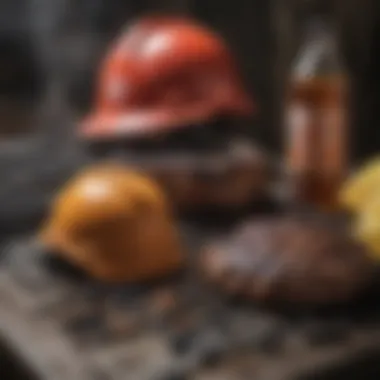Essential Guide to Selecting BBQ Cleaners


Intro
Grilling is a cherished tradition for many, but maintaining the grill can be a laborious task. The importance of using the right BBQ cleaner cannot be understated. In this guide, we will explore the key aspects of selecting and applying effective cleaners. This discussion will aid both beginner and seasoned grillers in maintaining not only cleanliness, but also the performance and longevity of their equipment.
Good BBQ cleaners help remove residue and grease that can impact the flavor of food. They ensure safety and hygiene, preventing unpleasant flavors and bacteria that can build up over time. This guide will provide clear direction on the types of cleaners available, how to use them effectively, and what to think about when choosing a product.
Let's detail the types of cleaners, their applications, and alternatives that can be easily accessed.
Types of BBQ Cleaners
Not all cleaning agents are created equal. Understanding the variety of options is crucial in making an informed decision.
Commercial Cleaners
Commercial cleaners are specifically formulated for BBQ grills and come in various types:
- Liquid Solutions: These come in spray bottles or squeeze bottles and can penetrate grease effectively.
- Foaming Cleaners: Ideal for vertical surfaces, these products cling longer, allowing for deeper cleaning.
- Wipes: Convenient for quick clean-ups post-cooking.
Choosing a reputable brand can ensure effectiveness. Popular products include Weber Grill Cleaner and Easy-Off BBQ Cleaner. Always follow the manufacturer’s instructions for the best results.
DIY Alternatives
Some individuals prefer a more natural approach using materials that are often found at home. Here are a few:
- Vinegar and Water: A simple mix that offers a mild cleaning solution.
- Baking Soda Paste: Combine baking soda with water to form a paste that can scrub tough stains.
- Lemon Juice: Effective due to its acidic nature, it can tackle grease while providing a fresh scent.
Factors to Consider
Selecting the right cleaner involves several considerations:
- Material of the Grill: Stainless steel requires different care compared to cast iron.
- Health and Safety: Opt for non-toxic options if there are concerns about chemical exposure.
- Sustainability: Look for biodegradable solutions whenever possible.
Application Techniques
The method of application can significantly impact how well a cleaner works. Here are general steps to follow:
- Preheat the grill for about 15 minutes. This helps loosen stuck-on food.
- Apply the cleaner according to the instructions; generally, spray or wipe onto surfaces.
- Use a scrub brush or sponge to remove grime, focusing on heavily soiled areas.
- Rinse thoroughly with water to avoid chemical residue.
"Regular maintenance not only enhances flavor but extends the lifespan of your BBQ grill."
Best Practices for BBQ Maintenance
Maintaining a BBQ involves more than just cleaning. It is prudent to follow best practices:
- Clean the grill grates after each use.
- Avoid using metal scrubbers on coated grills, as they can scratch the surfaces.
- Store the grill properly when not in use, preferably covered to prevent outdoor elements from causing damage.
Intro to BBQ Cleaners
Maintaining a grill is vital for both its longevity and the quality of the food it produces. Understanding BBQ cleaners helps grill enthusiasts keep their equipment in optimal condition. Various cleaners exist, each designed for specific tasks. Proper use ensures the removal of grease, food particles, and dirt without damaging the grill's surface. This knowledge not only prolongs the grill’s life but also enhances safety during cooking.
The Importance of Grill Maintenance
Regular maintenance of your grill cannot be overstated. A clean grill not only looks better but also performs better. It prevents the buildup of harmful bacteria that can compromise food safety. Cooking on a dirty grill can result in unpleasant flavors and unpleasant health risks. Over time, accumulated grime can damage the grill itself, leading to costly repairs or replacements.


Moreover, routine cleaning preserves the equipment's aesthetic appeal. Clean grills are more inviting and showcase the owner's commitment to quality cooking. Hence, the value of routine cleaning cannot be overlooked by any serious grill enthusiast.
Why Use a Dedicated BBQ Cleaner?
Using a specialized BBQ cleaner is essential for effective cleaning. These products are formulated to tackle the unique challenges of outdoor cooking equipment. They can dissolve tough grease and effectively remove burnt-on food. Dedicated BBQ cleaners often contain powerful ingredients that are more effective than general-purpose cleaning products, which might not target grill-specific residues.
Additionally, dedicated cleaners are designed to be safe for your cooking surface, minimizing the risk of scratching or damaging materials like stainless steel or ceramic. Selecting the right cleaner promotes better cooking results, as residues from all-purpose cleaners could potentially alter the taste of food.
Ultimately, the use of dedicated BBQ cleaners helps maintain the grill's performance and ensures it remains a reliable tool for enthusiasts. Taking the time to choose the right cleaning product can significantly affect both the longevity of your grill and the flavor of your meals.
"Choosing the right cleaner is part of a larger maintenance routine essential for the optimal performance of any grill."
Types of BBQ Cleaners
The choice of BBQ cleaners can significantly influence the cleaning process and the longevity of your grill. It is essential to know the types available to make informed decisions. Each type of cleaner serves specific functions and carries distinct benefits. Understanding these options can help maintain grill hygiene more effectively, ensuring your cooking surface is not only clean but also safe for food preparation.
Commercial Cleaners
Commercial BBQ cleaners stand out in the market. They are formulated to handle tough grime and have specific ingredients that target grease and burnt food. Brands such as Weber and Easy-Off provide powerful cleaning solutions that work well on various grill surfaces. One of the benefits is their convenience. You can easily spray or apply these cleaners, allowing for quick application.
However, it is crucial to read the labels carefully. Some commercial cleaners may contain harsh chemicals. Usage in a well-ventilated area is recommended, and protective gloves can be a good idea. For serious enthusiasts, these products can save time and effort.
Eco-Friendly Options
Eco-friendly BBQ cleaners are becoming popular among health-conscious consumers. These products often contain natural ingredients, making them safer for both users and the environment. Brands like Seventh Generation and Simple Green cater to this demand.
Using eco-friendly options has several advantages. They typically avoid aggressive chemicals, which can harm your grill or environment. Moreover, they can help promote a safer cooking environment for your family because there are fewer chemical residues involved.
One downside is that eco-friendly cleaners may require a bit more elbow grease. Their effectiveness can sometimes fall short compared to stronger commercial products. However, they can still be very effective with some persistence.
DIY BBQ Cleaners
DIY BBQ cleaners offer a fun and cost-effective way to maintain your grill. Common household ingredients like vinegar, baking soda, and lemon juice can be powerful cleaning agents. Many enthusiasts appreciate the customization and control over the ingredients. For example, a popular recipe involves mixing vinegar and baking soda, which creates a foamy solution that loosens grime effectively.
There are many benefits to using a DIY approach. First, it cuts down on the cost compared to purchasing pre-made cleaners. Secondly, it allows you to avoid potentially harmful chemicals. However, effectiveness can vary based on the recipe used and the degree of buildup in your grill.
In summary, selecting the right type of BBQ cleaner is critical for achieving optimal cleaning results. Each option, whether commercial, eco-friendly, or DIY, brings unique strengths. Understanding these types allows users to choose what best fits their needs and preferences.
Choosing the Right BBQ Cleaner
When it comes to barbecue maintenance, choosing the right BBQ cleaner is a crucial step. Proper cleaning not only extends the life of your grill but also ensures a better cooking experience. Removing grease and residue allows your food to taste its best. Selecting the right product involves understanding your grill type, considering the safety of the ingredients, and assessing how effective the cleaner will be for your needs.
Assessing Your Grill Type
Different grills have distinct materials and constructions that determine the type of cleaner that is most effective. For instance, a stainless steel grill may require a different approach compared to a cast iron or porcelain-coated grill. Using a harsh chemical on a delicate surface could lead to damage, affecting the aesthetic and functional quality of your grill.
- Material Considerations: Identify if your grill is made of stainless steel, cast iron, or aluminum. Each material has its vulnerabilities.
- Type of Grill: Gas, charcoal, or electric grills might interact differently with certain cleaners. Understanding the nuances can prevent mishaps.
- Manufacturer Instructions: Always refer to the guidelines provided by the grill manufacturer. These guidelines often specify compatible cleaning agents.
By considering these factors, you can choose a cleaner that meets the specific requirements of your grill without causing harm.
Ingredient Safety and Suitability
The safety of the ingredients in your BBQ cleaner cannot be overstated. Many conventional cleaners contain harsh chemicals that can be harmful not only to you but also to the food you prepare. Assessing the safety of these ingredients involves:
- Understanding Labels: Read product labels carefully. Look for specific indications about the safety and suitability of the ingredients for food contact surfaces.
- Researching Ingredients: Consider researching common ingredients in barbecue cleaners. Natural or organic options are often safer than traditional solvents.
- Allergy Considerations: If you or your family members have allergies or sensitivities, ensure the chosen cleaner doesn’t contain potential allergens.


Selecting a cleaner with safe ingredients contributes to both environmental health and personal safety.
Effectiveness and Efficiency
Not all BBQ cleaners are created equal in terms of their effectiveness and efficiency. A good cleaner should not only remove grease but also sanitize surfaces. In assessing this, consider:
- Cleaning Power: Look for cleaners that are specifically designed to cut through tough grease and grime. Check reviews or testimonials to gauge real-world performance.
- Application Ease: The method of application can greatly affect how efficacious a cleaner is. Sprays, wipes, or foams might vary in use case and effectiveness.
- Time Consideration: Some cleaners require longer dwell times, while others work quickly. Select one that fits your cleaning schedule.
Incorporating products that efficiently tackle cleaning tasks saves time and enhances your BBQ experience.
Choosing the right BBQ cleaner not only improves the lifespan of your grill but also elevates the quality of your cooking.
How to Use BBQ Cleaners Effectively
Using BBQ cleaners effectively is a significant aspect of grill maintenance. The right approach ensures that your grill not only looks good but also operates efficiently. Proper cleaning can enhance the flavor of your food and extend the lifespan of your grill. Understanding how to use BBQ cleaners is essential for anyone who loves cooking outdoors.
Preparing Your Grill for Cleaning
Before applying any cleaner, preparation is crucial. Start by disconnecting the gas supply for propane grills, or unplugging electric grills. Allow the grill to cool down if it has just been used. Wait at least 30 minutes after cooking. This not only ensures safety but also makes cleaning easier. Next, remove grates, flame tamers, and other removable parts for an thorough clean. You may want to use a putty knife or scraper to remove any large food chunks or burnt residue on surfaces. Once the grill is cool and disassembled, you will be ready for the next steps.
Applying the Cleaner
When it comes to applying BBQ cleaners, effectiveness is key. Choose a cleaner that suits your needs; whether it is a commercial brand or a DIY mixture, read the instructions carefully. Spray or apply the cleaner generously, ensuring it covers all surfaces including inside the grill, grates, and other detachable parts. If using a DIY cleaner, ensure that the mixture is well combined. Allow the cleaner to sit for the specified time. This will help dissolve grime and make scrubbing easier. Make sure to follow any specific guidelines related to the type of cleaner you are using.
Scrubbing Techniques
After the cleaner has had time to work, it's time to scrub. Use a sturdy grill brush or a non-abrasive sponge. In circular motions, scrub the surfaces you previously coated with cleaner. For grates, a grill brush is often preferred due to its bristles designed to reach between the spaces. Pay attention to any stubborn spots. Sometimes, extra effort is needed to remove tough stains or burnt-on food. Remember to clean any non-metal parts carefully to avoid scratches.
Final Rinsing and Drying
The final step is rinsing and drying off the cleaned components. Use warm, soapy water for rinsing tools like grates and flame tamers. For the inside of the grill, a damp cloth will suffice. Ensure all residue from the cleaner is removed, as leftover chemicals can affect the taste of food the next time you cook. After rinsing, allow all parts to air dry completely. This is essential to prevent corrosion and maintain longevity of your grill. Reassemble your grill only after all pieces are dry.
Remember: Regular and proper cleaning not only improves taste but keeps your grill in optimum condition.
DIY BBQ Cleaner Recipes
DIY BBQ cleaner recipes are essential for those who prefer to have control over the ingredients in their cleaning solutions. By using natural components, one can avoid exposing themselves and the environment to harsh chemicals found in many commercial cleaners. This section provides valuable insights into creating effective and safe alternatives for cleaning grills. The benefits include cost savings, accessibility of ingredients, and the satisfaction of making something by hand. Considerations for DIY cleaners also involve understanding the effectiveness of these recipes against grease and grime.
Vinegar and Baking Soda Solution
A vinegar and baking soda solution is one of the simplest and most effective DIY BBQ cleaners. Vinegar acts as a natural disinfectant and deodorizer, while baking soda works as a powerful abrasive that helps in scrubbing away tough stains. To create this solution, mix equal parts of white vinegar and water in a spray bottle, then sprinkle baking soda directly onto your grill surfaces.
- Spray the vinegar mixture generously on the grill surface.
- Sprinkle baking soda on top of the sprayed areas.
- Let it sit for a few minutes.
- Scrub using a non-abrasive sponge or brush to remove grease and buildup.
- Rinse thoroughly with warm water.
This method not only cleans the grill but also leaves it smelling fresh. It is safe and easy to use, making it suitable for grill enthusiasts of all experience levels.
Lemon Juice and Olive Oil Mix
The lemon juice and olive oil mix is another effective DIY solution. The acidity in lemon juice helps cut through grease and also imparts a pleasant citrus aroma. Olive oil adds a protective layer that can help prevent food from sticking to the grill next time it is used. To create this cleaning solution:
- Combine half a cup of lemon juice with one cup of olive oil in a bowl.
- Apply the mixture onto the grill with a cloth or sponge.
- Allow it to sit for ten to fifteen minutes.
- Wipe down the surfaces to remove food residue.
- Rinse with warm water to finish.
This recipe offers a natural cleaning method that also provides the added benefit of conditioning the grill grates.
Essential Oils and Vinegar Blend


An essential oils and vinegar blend provides a fragrant approach to grill cleaning. Certain essential oils, such as tea tree oil or eucalyptus oil, possess antibacterial properties, making them excellent choices for cleaning. To prepare this blend:
- Combine one cup of vinegar with a few drops of your chosen essential oil in a spray bottle.
- Shake well to mix the ingredients thoroughly.
- Spray the mixture on the grill surfaces.
- Allow it to sit for several minutes to penetrate any grime.
- Scrub with a sponge or brush, then rinse with warm water.
This method can enhance the overall grilling experience with its pleasant scent while simultaneously ensuring that your grill remains in excellent hygiene.
Precautions and Safety Tips
Maintaining a safe environment while using BBQ cleaners is crucial for effective grill maintenance. Ignoring safety measures can lead to injuries or harmful reactions. Therefore, understanding and implementing proper precautions not only enhances personal safety but also ensures the cleaning process is more efficient. This section explores essential safety aspects related to BBQ cleaning that every enthusiast should keep in mind.
Using Protective Gear
When handling BBQ cleaners, wearing protective gear is essential. At a minimum, one should wear gloves to protect hands from potential irritants. Chemicals in some cleaners can cause skin burns or irritation. Additionally, safety goggles can shield eyes from splashes. If you are using strong commercial cleaners, consider a mask to avoid inhaling fumes. The importance of protective gear is simple: it prevents direct contact with harmful substances and maintains overall health during the cleaning process.
Avoiding Harmful Chemical Reactions
BBQ cleaning products often contain powerful chemicals. Some components may react adversely when mixed with others, resulting in harmful fumes or corrosive reactions. For example, combining products with bleach and ammonia creates toxic chloramine vapors. Always read the labels carefully to check for warnings against mixing products. Storing cleaners properly also reduces risk; keep them in a cool, dry place and away from direct sunlight. Clear understanding about chemical interactions not only aids in preventing accidents but also ensures cleaning effectiveness.
Proper Ventilation Practices
Good ventilation is often an overlooked aspect of using BBQ cleaners. Many cleaners emit fumes that can be dangerous if inhaled in enclosed areas. Before starting the cleaning process, ensure the space is well-ventilated. Open windows and doors to create airflow, or consider working outdoors if possible. If indoors, exhaust fans can help circulate air effectively. Taking these measures minimizes inhalation risks and enhances safety for anyone nearby. Ventilation, while simple, plays a key role in transforming a potentially hazardous environment into a safer one.
"Safety is not just a priority; it is a culture. Embrace it to ensure a successful BBQ maintenance routine."
Overall, these precautions and safety tips should serve as foundational practices for anyone involved in BBQ cleaning. Prioritizing health and safety makes the process smoother and promotes a better experience over time.
Long-term Grill Maintenance
Maintaining a grill over the long term is an essential part of ensuring its efficiency and performance. Regular care not only prolongs the life of the grill but also guarantees that your cooking surface remains safe and effective. Long-term grill maintenance fosters a better grilling experience, allowing for optimal flavor and heat management, which are crucial in culinary endeavors. Moreover, keeping a consistent maintenance routine can prevent costly repairs and replacements in the future.
Regular Cleaning Schedule
Establishing a regular cleaning schedule is vital for maintaining a grill. A systematic approach helps to monitor the condition of both the exterior and the interior of your grill.
- Weekly Practices: Depending on the frequency of use, it is wise to perform a light cleaning at least once a week. This can include removing food debris from grates, wiping down surfaces, and checking for any build-up in burners.
- Monthly Checks: Conduct a thorough inspection monthly. Scrub the grates with a suitable cleaner and inspect grease traps and drip pans. This helps in catching any accumulated grime before it turns into a more significant issue.
- Yearly Deep Clean: Allocate time for a complete deep clean once a year. This involves disassembling parts, scrubbing thoroughly, and ensuring all components work efficiently. Regularly checking hoses and connections for wear and tear is crucial as well.
A cleaning schedule creates discipline. It reminds you to keep your grill in peak condition, making your outdoor cooking much more enjoyable and safe.
Seasonal Deep Cleaning Techniques
Deep cleaning techniques should change with the seasons. This adaptability ensures that the grill remains functional through varying environmental conditions.
- Spring Clean:Heading into the grilling season, a deep clean is essential. Scrub the grates with a vinegar solution and use a wire brush. Check for rust on metal surfaces and apply protective coatings as needed.
- Summer Maintenance: During peak grilling months, focus on maintaining cleanliness. Use a natural cleaner to avoid interaction with food. A quick clean after each use refrains from letting grease build-up.
- Autumn Preparation: As grills may be stored for winter, a thorough cleaning is necessary. Remove all parts, clean and dry them, then cover to protect against the elements. Use a local product that protects against moisture.
- Winter Care: If your grill is kept outside, a light clean during winter months ensures functionality. Consider using a grill cover to avoid snow and ice build-up.
These seasonal techniques help to prepare your grill for the different usage periods throughout the year, maximizing lifespan and usability.
"A well-maintained grill not only enhances the taste of your food but also keeps you safe while cooking."
Long-term grill maintenance is not just about cleanliness; it incorporates checks and adjustments that can affect meal quality. By committing to a proper routine, you ensure that your grilling experience remains enjoyable and efficient for years to come.
Closure
In this article, we have explored the detailed realm of BBQ cleaners, emphasizing their significance in maintaining grill hygiene and enhancing cooking efficiency. A proper cleaning regime ensures not only a better flavorful experience but also contributes to the longevity of your grill. Selecting the right cleaner requires understanding your grill type, the nature of the residues you are dealing with, and the specific ingredients of the cleaner.
Recap of Key Points
- Importance of Maintenance: Regular cleaning prevents build-up, which can affect food taste and pose health risks.
- Types of Cleaners: Understanding the distinctions between commercial, eco-friendly, and DIY options allows users to make informed choices.
- Choosing Wisely: Factors like ingredient safety and the effectiveness of the cleaner should guide your selection process.
- Application Techniques: Proper cleaning methods, from preparation to rinsing, are essential for effective results.
- Safety Precautions: Personal safety, avoiding harmful reactions, and ensuring good ventilation are critical when using BBQ cleaners.
- Long-term Care: Establishing a regular cleaning schedule enhances the overall experience and maintains grill performance over time.
Final Thoughts on BBQ Cleaners
Maintaining a clean grill goes beyond aesthetics. High-quality BBQ cleaners can significantly enhance the cooking process and prolong the lifespan of the grill. As we have discussed, the journey of finding the right cleaner involves understanding various types, safety measures, and techniques for effective application. Each step plays a role in achieving optimal results. Ultimately, the choice of BBQ cleaner reflects not only the desire for cleanliness but also a commitment to health and flavor. Embrace these practices to enjoy safe, delicious meals for years to come.



